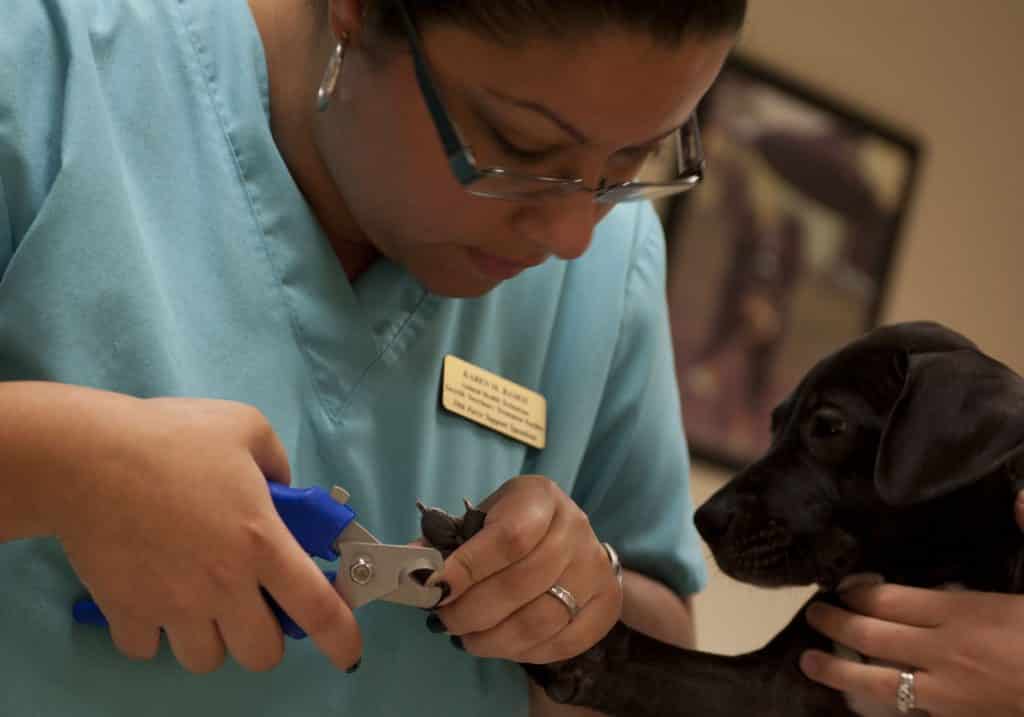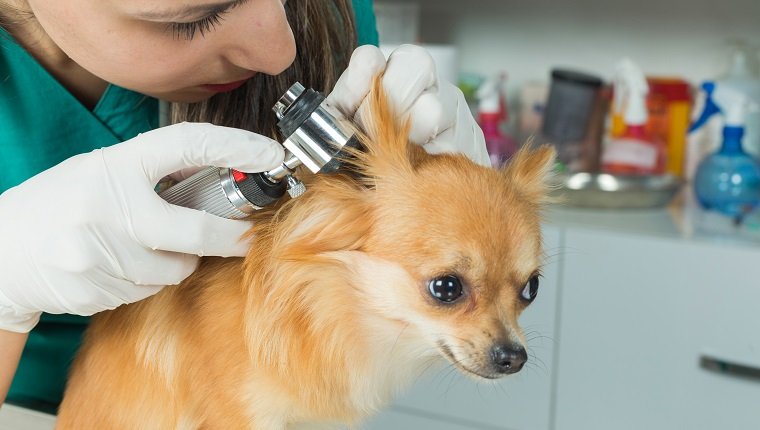Are you a proud new puppy parent? There’s a lot going on: you’re enjoying the high energy and affection of a puppy, but you’re also navigating so many new responsibilities. In the midst of all the excitement, don’t forget to take your puppy to his or her first wellness exam. As a veterinarian, the number one piece of advice I give new puppy parents is to be sure to stay on top of your dog’s checkups. After all, your dog’s health is now in your hands.
Regular wellness checkups, which are routine medical evaluations of a healthy pet, by your veterinarian, will ensure you’re on the right track for a long-lived dog. In this article, I’ll guide you through what happens at the first puppy wellness checkup and what you can expect during and after this vet visit.
What Is the Puppy Wellness Checkup?
At 8 weeks of age, your puppy is ready for her first exam by a veterinarian. If you have any concerns when you first acquire your new pup, no matter how young, you can always bring them in for an exam, but a wellness checkup will have the five following components.
1. Physical Examination
First, your vet will give your puppy a full physical exam. They’ll be looking for all the signs of a healthy dog. This includes:
- Weight
- Body temperature (rectal is the most common method)
- Attitude: looking for a bright, alert, and responsive disposition
- Standing and walking normally
- Checks for congenital abnormalities
- Heart: listening for murmurs or signs of a heart condition
- Lungs: making sure there’s no pneumonia or respiratory problems
- Umbilicus: checking for a hernia or bulge where the intestine is poking through the abdominal wall
- Teeth: baby teeth will have erupted in your puppy’s mouth at this point and he may be teething
- Gums: checking for pink, healthy tissue
- Eyes: checking for conditions like congenital cataracts, blindness, and more
- Ears: checking with an otoscope and evaluating hearing
2. Parasite Control
An important step for any dog, but especially for vulnerable puppies.
- Dewormer will be given orally for internal parasite control
- Flea and tick control will be discussed and product recommendations provided
- A fecal exam will test for internal parasites (this means you should bring in a poop sample! Good thing you have so many poop bags…)
3. Vaccinations
You can expect for the first round of vaccines to be given at this point. Core vaccines start at 8 weeks of age and are usually given in the 5-in-1 combination of protecting against Distemper, Parvovirus, Parainfluenza, Adenovirus-1, and Adenovirus-2.
You can find out more about vaccines in this Rover article and at AVMA’s FAQs on vaccinations.
4. Toenail Trim
This can be requested in some hospitals and many vets or veterinary technicians are happy to show you how to trim puppy toenails properly.

Karen Ramos, 39th Force Support Squadron animal health technician, clips the nails of Chloe, the dog of Airman 1st Class Jordan Capela, 39th Security Forces Squadron, and his wife, Brooklyn, at the veterinary clinic Aug. 18, 2011, at Incirlik Air Base, Turkey.(U.S. Air Force photo by Airman 1st Class Clayton Lenhardt/Released)
5. Additional Tests
There are additional tests that may be required as part of your veterinarian’s wellness package. This could include an analysis of the urine, a complete blood count, and a serum chemistry.
Having a baseline from these tests provides a comparison for any future bloodwork your dog may need.
Questions to Ask at the Puppy Exam
This is your best opportunity to get expert advice on how to best care for your puppy and prevent health problems in the future. Your veterinarian is a great resource, and they love to answer questions. Feel free to ask any and all of the following:
- What breed-specific health problems should I watch for?
- When is the best time for me to spay or neuter my dog?
- When is the earliest I can let my puppy be social with other dogs and go outside?
- What type of pet insurance do you recommend?
- Is he at a healthy weight for his age and breed?
- What type of food (brand, type, canned, dry) do you recommend I feed my puppy, and why?
- At what age do you recommend I switch over to adult food?
- How much should I feed my puppy and how many times a day? When should the amount and frequency change?
- How much should I play and exercise my puppy?
- How can I train my dog to stop using his mouth to play with me or the family?
- How do I house-train my dog?
- What can I do to minimize my dog’s anxiety and build their confidence?
Also, check for resources for puppy trainers, puppy training videos, pamphlets, and websites. Your vet’s office is likely aware of well-reviewed local options.

https://www.flickr.com/photos/evocateur/6342530545
After the Puppy Wellness Checkup
At your next visit(s), expect another round of vaccines and dewormer. It’s a good idea to let your veterinarian know if your puppy had any reactions to the last set of vaccines and to report how your dog is adapting at home.
All of the same parameters in the physical exam for the first wellness checkup apply during round two.
The final set of vaccines are given at 16 weeks of age, at which time you can start setting up yearly annual checkups. All puppies are different, so the services provided in these checkups can be tailored to your dog depending on what they need.
A puppy wellness exam is very routine and can even be fun! The main goal is to keep your puppy in optimal health. Your veterinarian, you, and your puppy are all on the same team, from now until your dog’s senior years.




